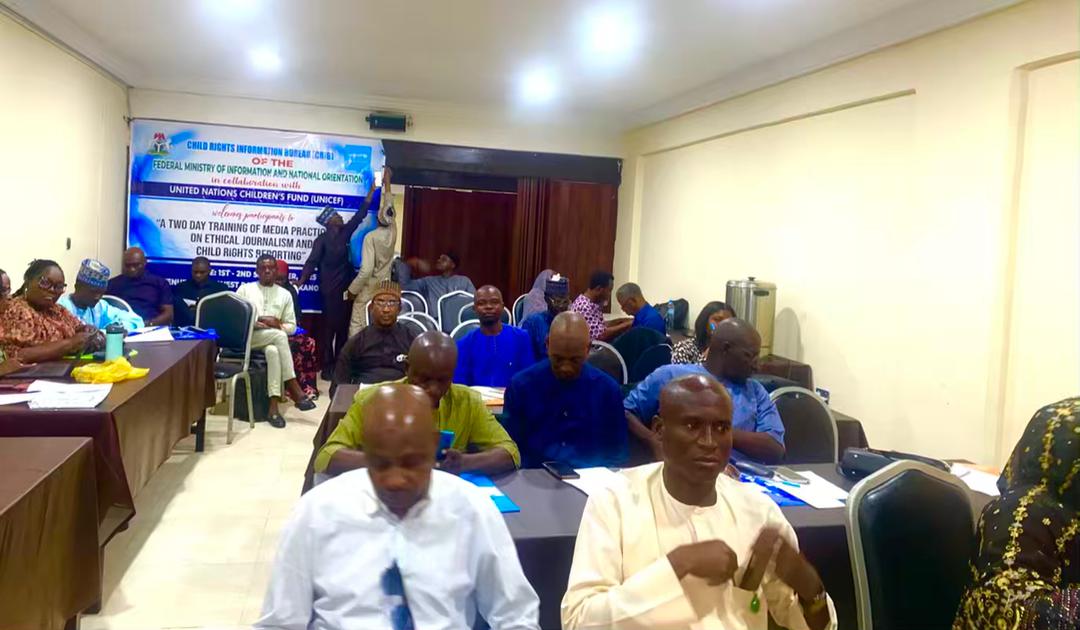By; ALEX UANGBAOJE, Kaduna Media practitioners from across Northern Nigeria have been charged to uphold the highest ethical standards when repo
By; ALEX UANGBAOJE, Kaduna
Media practitioners from across Northern Nigeria have been charged to uphold the highest ethical standards when reporting on children.
The two-day intensive training on Ethical Journalism and Child Rights Reporting in Kano, organized through the Child Rights Information Bureau (CRIB) in collaboration with UNICEF, brought together journalists from Kaduna, Kano, Sokoto, Kebbi, Zamfara, Jigawa, Nasarawa, Niger, Katsina, and the Federal Capital Territory.
Speaking at the opening, Temitoye Falayi, Assistant Director and Head of Advocacy at CRIB, underscored the vital role of the media in shaping public perception and influencing policies that affect children.
He commended UNICEF for its consistent partnership with government to strengthen child rights advocacy through journalism.
“As journalists, you have a unique and powerful responsibility to safeguard the rights of children through your work. This requires a deep understanding of child protection laws, ethical reporting principles, and the specific vulnerabilities children face in Nigeria,” Falayi told participants.
He stressed that while the media has drawn attention to the struggles of mothers and children, much more remains to be done before Nigerian children can truly live in dignity and safety.
Delivering the keynote, Rahama Mohammed, UNICEF Chief of Field Office in Kano, declared that ethical child reporting is not merely a professional obligation but a moral responsibility.
He emphasized that ethical journalism plays two vital roles: building trust in a diverse society and protecting vulnerable children.
“In a fragile context like Northwest Nigeria, where insecurity and tension persist, responsible reporting can cool tempers, foster dialogue, and promote peace. But irresponsible reporting can inflame passions and endanger lives,” Mohammed cautioned.
Highlighting UNICEF’s concern, he cited a scenario where a young girl who survived abduction and gender-based violence had her identity carelessly revealed by the press. Instead of empowering her, such reporting inflicted permanent stigma and isolation.
“That kind of reporting re-victimizes children. A sensational headline may sell papers, but an ethical story protects a child’s right to a future free from shame and harm,” he said.
Over the course of the training, participants examined the Child Rights Act, international conventions, and ethical frameworks guiding media practice.
They also explored best practices for interviewing children and handling sensitive information, discussed ways to protect the identities of children affected by conflict, abuse, and exploitation, and shared storytelling approaches that advocate for children’s rights without sensationalism.
The engagement also addressed the unique challenges children face in different regions of Nigeria, from out-of-school crises to health emergencies and the impact of conflict.
The dialogue made clear that journalists are not just conveyors of news, but custodians of children’s dignity and future.
“Every choice you make, what to report, how to report it, and whom to protect, shapes the narrative of this region and the future of Nigeria.
“By choosing ethics, you choose truth. By reporting responsibly, you choose peace. By protecting children, you choose a better Nigeria,” Mohammed added.
Organizers called on journalists to commit to ethical reporting standards that prioritize children’s rights, promote peace, and hold duty bearers accountable.




COMMENTS